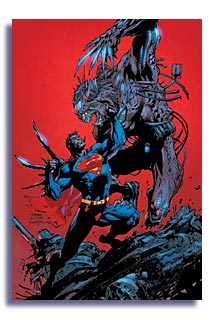Jim
Lee delineates Superman as a near-god, perfection from every
angle. Thankfully keeping the art from too much idle idol
worship, Brian Azzarello writes even supermen as men, struggling
with their consciences and their purpose in life. 'Tis a
consummation devoutly to be wished. So why isn't this comic
book dream team putting out a more enjoyable book?
Worse,
why do I find myself actually preferring Action,
written by Chuck Austen? Kill me now.
It's
not as if Azzarello hasn't set up an intriguing premise.
In this arc, Superman battles superfoes externally and overwhelming
guilt internally for the disappearance of hundreds of thousands
of people, including Lois Lane, the previous year. He doesn't
know why it happened; he only knows that somehow, he failed
them.
And
so he turns to a priest for, if not absolution, at least
a sounding board. Like most priests in popular fiction,
this one, too, struggles over his own purity. While the
two bandy deep thoughts back and forth, Superman occasionally
gets called away to take down a monster here, or interfere
with world politics there.
Perhaps
the biggest problem lies in this being something out of
Azzarello's usual realm. He writes intrigue and crime well,
but falters with characters so archetypal. Just as Azzarello's
Batman didn't feel like Batman in his arc with Eduardo Risso,
"Broken City," this Superman seems like the character in
the story Azzarello cares about the least. For sweep, the
writer puts the Last Son of Krypton in the midst of a fictitious
Middle Eastern country's revolution, with characters that
give you the nagging feeling you've seen it all before and
can't remember if you liked it. Plus, Azzarello writes for
an artist whose forte lies in drawing beautiful people and
hideous creatures fighting, so it doesn't matter what you
think about it, anyway.
It's
not that Lee can't draw quiet moments; it's more that there
seems little point to such an exercise. He works best in
big splashy moments, because without a lot of noise you
notice how impossibly fine looking everyone is - except
of course, for the monsters.
Here,
the monster is something called Equus, a high-powered techno-workhorse
with a strong enough resemblance to Doomsday to push sales.
As a character design, Equus has little of the horse about
him, except maybe the lenses over his eyes that could stand
in for blinders. As ugly as Equus is, though, Azzarello
presents the possibility that while in service to the revolutionary
General Nox, he actually is a noble steed. But can you believe
that Superman would fly into a room full of slaughter and
be persuaded somehow not to bring the perpetrator
to some sort of justice, even if the citizenry are grateful
for the killing? (Any resemblance to current events must
be strictly coincidental. Kaff kaff.)
Azzarello
would have us believe that Superman would compromise his
own moral vision in such a situation. But then, he compromises
it every time he interferes with politics. At least when
fighting Zod, you could understand his getting involved.
Maybe
America is stuck in a grey area. In the gloom, Azzarello
certainly can spin a pretty good yarn. But somehow, no matter
how doubt-filled he may be, Superman does not belong in
that fog. He's too bright, too colorful, too important to
us as a symbol of something better. Though Austen may write
a Superman who may be a little cocky, at least that Superman
remembers who he is.
Rating:







